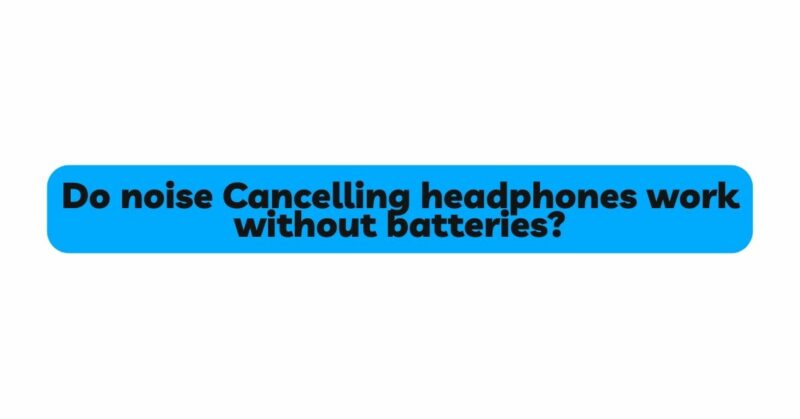Noise-canceling headphones have revolutionized the way we enjoy our audio experiences, offering a haven of tranquility amidst the bustling noise of modern life. These headphones utilize advanced technology to eliminate external noises, creating an immersive environment for music enthusiasts and professionals alike. However, one pressing question arises: Do noise-canceling headphones work without batteries? In this article, we delve into the intricacies of noise-canceling technology, exploring whether these headphones can operate without a battery. By understanding the implications and limitations, we shed light on the core of silence that noise-canceling headphones provide.
- The Magic of Noise-Canceling Technology:
Noise-canceling headphones employ innovative technology to counteract external sounds and deliver a focused and undisturbed audio experience. By generating sound waves that are the mirror image of incoming ambient noises, these headphones effectively cancel out unwanted sounds, allowing users to revel in their chosen audio content.
- Understanding the Role of Batteries:
Before delving into whether noise-canceling headphones can function without batteries, it is essential to grasp the role of batteries in these devices. Batteries serve as the primary source of power for noise-canceling technology, fueling the headphones’ ability to create sound waves that counteract ambient noises.
- Introducing Noise-Canceling Headphones:
Noise-canceling headphones come in various designs, ranging from over-ear to in-ear models. These headphones often feature a built-in rechargeable battery that powers the noise-canceling function and other essential features like wireless connectivity and active audio playback.
- Do Noise-Canceling Headphones Work Without a Battery?
To determine whether noise-canceling headphones can operate without a battery, we must refer to the official documentation provided by headphone manufacturers. Industry leaders such as Bose, Sony, and Sennheiser offer valuable insights into the functionality and requirements of their noise-canceling headphones.
- The Official Stand: Battery Dependence of Noise-Canceling Headphones
As of the time of writing, the official documentation for noise-canceling headphones indicates their dependence on batteries for noise-canceling technology to function. Noise-canceling headphones require a power source to generate the counteractive sound waves that block external noise, and this power is typically supplied by a built-in battery.
- Implications of Operating Without a Battery:
Attempting to use noise-canceling headphones without a battery poses significant implications and limitations. Without a power source to fuel the noise-canceling function, the headphones will lose their noise-canceling capabilities, rendering them similar to regular headphones.
- Passive Noise Isolation: An Alternative Option
While noise-canceling headphones require batteries for their active noise-canceling function, some headphones offer passive noise isolation. Passive noise isolation relies on the physical design of the headphones, such as noise-sealing earcups or tight-fitting ear tips, to block out external sounds without the need for electronic components or batteries.
- Hybrid Noise-Canceling Headphones:
Some headphones feature a hybrid design that combines both active noise canceling and passive noise isolation. In these models, the noise-canceling function may require a battery to operate, but the passive noise isolation can still be effective without the battery’s involvement.
Conclusion:
Noise-canceling headphones have become a sanctuary for audio enthusiasts seeking a peaceful and immersive listening experience in the midst of a noisy world. The magic of noise-canceling technology lies in its ability to counteract external sounds, providing users with a haven of silence. However, this technology depends on a power source, typically a built-in battery, to function.
As of the time of writing, noise-canceling headphones require a battery for their noise-canceling capabilities to work. Attempting to use these headphones without a battery will result in the loss of their noise-canceling function, making them similar to regular headphones.
While noise-canceling headphones do rely on batteries, some models offer passive noise isolation as an alternative option. Passive noise isolation uses the physical design of the headphones to block out external noise without the need for batteries or electronic components.
As technology continues to advance, headphone manufacturers may explore new ways to enhance noise-canceling technology and battery efficiency. Noise-canceling headphones are likely to remain a staple in the audio industry, providing users with the core of silence they seek to escape the noise and immerse themselves in the world of music and audio bli


